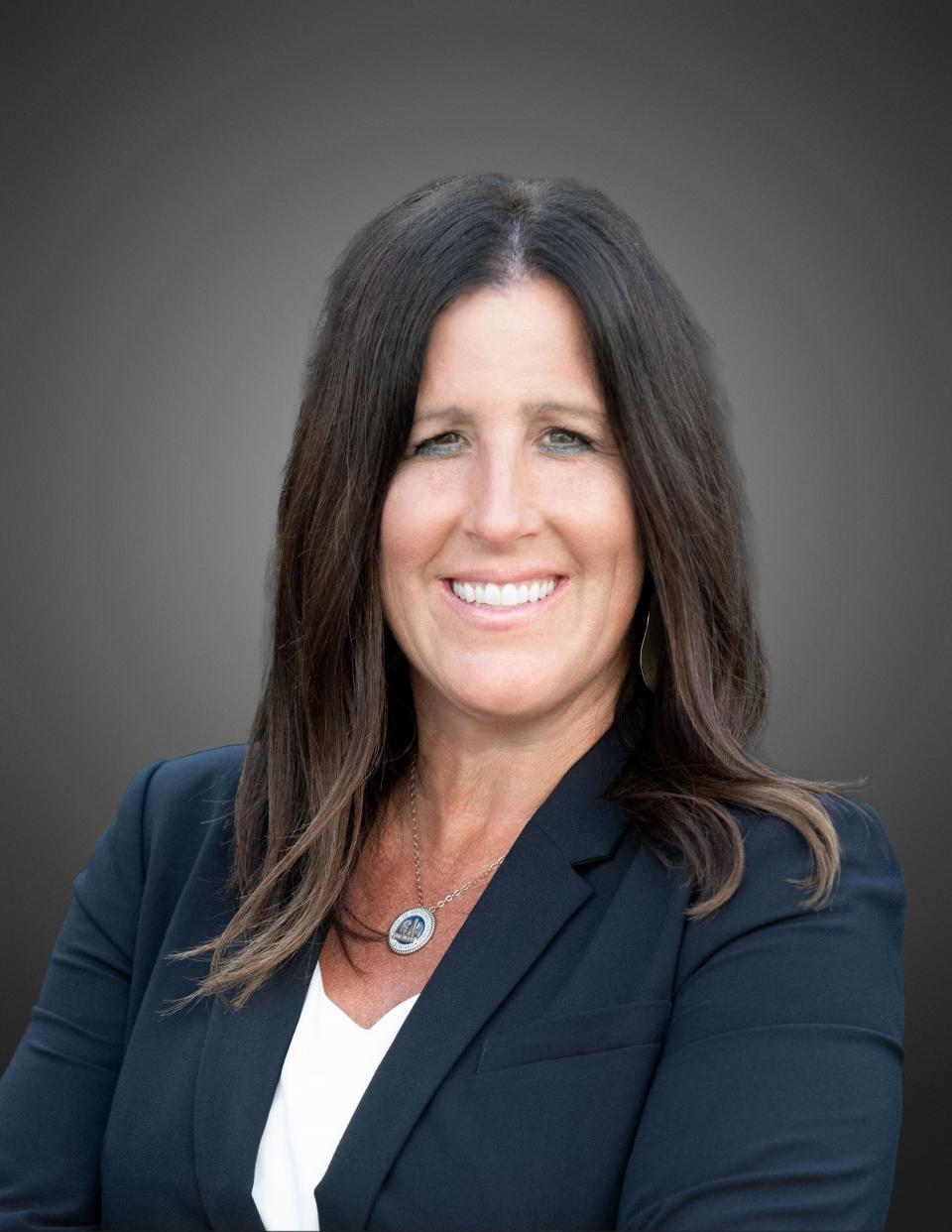What Billie Eilish has to do with Utah’s porn law

- Oops!Something went wrong.Please try again later.
The Louisiana law requiring pornographic websites to verify the age of users in an effort to keep children and teens from viewing explicit material had an unexpected beginning: It started with a lawmaker seeing an article about pop star Billie Eilish’s interview on the “Howard Stern Show.”
Since then, half a dozen states have adopted similar policies, including Utah.
In the interview with Stern, Eilish told him she started looking at pornography at age 11 and described its effects on her life. “The first few times I had sex, I was not saying no to things that were not good. It was because I thought that’s what I was supposed to be attracted to.”
Related
The interview stuck with Louisiana Rep. Laurie Schlegel who told me by phone that “it got the wheels in my brain moving.”

By profession, Schlegel is a licensed professional counselor and a certified sex addiction therapist, so she was aware of how pornography affects minors, but hearing Eilish be “that vulnerable” with Stern made the issue fresh again. And she thought since she was now in office, she might be able to do something about it.
“I knew I needed to educate the legislature on it,” Schlegel told me in a phone interview. “And my belief is once people really grasp the gravity of the situation, you have to act.”
That’s when Schlegel brought in Gail Dines, founder and president of the anti-pornography organization Culture Reframed, to speak about the issue to the Women’s Caucus of the Louisiana Legislature on Jan. 24, 2022. Schlegel recalled seeing Dines’ TEDx Talk “Growing Up in a Pornified Culture,” which led her to invite Dines to speak in a training session.
“Policymakers do not understand what has happened since the internet took over in 2000,” Dines told me. “They don’t understand that it made pornography more affordable, anonymous and accessible. And immediately, as the internet got into people’s homes, pornography became hardcore.”
Schlegel and Dines have some political differences. After all, Schlegel is a conservative politician and Dines is a feminist activist, but they agree on the harmful effects of online pornography on minors.
“It’s not a conservative issue. It’s an issue that spans all political groups because it’s a harms-based issue,” Dines said. “Now you need a feminist perspective because you need to understand what’s happening to women.” The sex shown in pornography, Dines said, is “disembodied” and “is based on the dehumanization and degradation of women.”
Related
BYU professor Brian Willoughby said that a significant amount of research shows pornography affects “sexual expectations and scripting.” What can happen to minors after they see pornography is it becomes “the only messaging that they’re receiving about what intimacy is supposed to look like.”
Since pornography doesn’t depict healthy sexual interactions, “that’s where we start to see the research that suggests that pornography becomes a risk factor for youth and minors, particularly when it comes to things like risky sex,” Willoughby said. Risky sex includes unprotected sex, multiple sexual partners, among other things.
When Dines explained some of the risks pornography poses to minors, the Louisiana Legislature responded to the bill Schlegel introduced with increased support. By the end of the bill’s process, it had nearly 50 co-sponsors.
Then, in June 2022, the bill, House Bill 142, passed almost unanimously through the Louisiana House 96-1 and the Senate 34-0. Though the Legislature is Republican-controlled in Louisiana, the state has a Democratic governor, John Bel Edwards, who has “no qualms” about vetoing bills he does not want to sign, Schlegel said.
Edwards signed the bill.
Christopher McKenna, CEO of Protect Young Eyes who testified in front of the U.S. Senate in 2019, said bills like the one passed in Louisiana are akin to protections minors had from pornography before the internet.
In fact, McKenna, Dines and Schlegel all used a similar analogy to explain: before the internet, pornography could be found in brick-and-mortar stores. There, adults were required to use identification to prove they were 18 or above. For a long time, internet pornography went unregulated but now similar restrictions are being put in place.
“It’s not getting in the way of adults,” McKenna said about age restrictions. “That’s the spirit of what the Supreme Court has said related to pornography, explicit content on websites and in digital spaces.”
“This should be the goal for legislation that is enacted: that we respect those constitutional areas, while also protecting children,” McKenna said.
Related
As bills similar to the one passed in Louisiana have come up in legislatures in Arkansas, Mississippi, Montana, Texas, Utah and Virginia, and have passed with support from politicians on both sides of the aisle.
In the Beehive State, Sen. Todd Weiler, R-Woods Cross, and Rep. Susan Pulsipher, R-South Jordan, introduced SB287, which passed unanimously. This legislation has caused Pornhub to retreat in some states.
Pornhub blocked access in Utah to its content after the bill was passed. Virginia, Mississippi and Arkansas have had access blocked as well, the Washington Examiner reported.
While this response did not occur in Louisiana, Schlegel said it didn’t surprise her. “That’s what happens when you have a highly unregulated billion dollar industry,” she said.
It’s also led to lawsuits in Utah and Texas.
The Free Speech Coalition, which represents the adult industry, challenged Utah’s and Texas’ laws in court. A judge dismissed the suit in Utah while Texas’ law was declared unconstitutional by a judge. U.S. District Judge David Ezra struck down the Texas law, saying it violates free speech rights and “will allow the government to peer into the most intimate and personal aspects of people’s lives.”
The state attorney general’s office immediately filed a notion of appeal to the Fifth Circuit U.S. Court of Appeals in New Orleans, according to PBS.
Related
Utah becomes first state to declare pornography a public health crisis
The issue of pornography as a health crisis is gaining national attention
Melissa Hackett, executive director of Utah Coalition Against Pornography, said the law in Utah is “a good start” and is the culmination of other legislation around pornography. The Beehive State was a trailblazer in the fight against online pornography as the state was the first in the country to declare pornography a public health crisis.
“This needs to be a bill that is continually addressed and looked after, modified and amended year after year as technology changes and with AI,” Hackett told me.
Evolving technology will likely throw a curve ball in the way that legislators treat the online pornography industry, but for now, states are continuing to pass legislation similar to what was passed in Louisiana and Utah.
It’s possible new legislation will lead to additional challenges in court, as happened with Utah and Texas. Eventually, the laws could end up in the Supreme Court, as happened with the Child Online Protection Act.
In 1998, President Bill Clinton signed this act into law, which was aimed at protecting children from exposure to sexually explicit material. The court struck this law down because “it was not narrowly tailored to serve a compelling governmental interest and because less restrictive alternatives were available.”
“Anytime that we are dealing with constitutionally protected speech, we as individuals who respect the Constitution must take great care in how that is managed,” McKenna said. Any law around restricting minors’ access to pornography would have to be “minimally restrictive” to adults.
“I think what we have started is good and necessary in these states,” McKenna said. But moving forward, “these should be the sort of markers that we should be looking for in terms of if this is good legislation that passes constitutional muster.”

